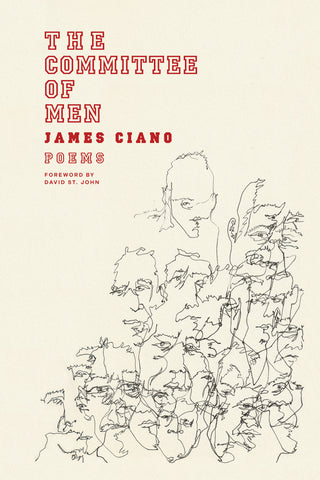
About This Title
James Ciano’s debut collection, The Committee of Men, explores the cycles of violence men inflict on one another and themselves, examining how silence, shame, and inherited expectations shape masculine identity. Rooted in the speaker’s experience as a college athlete from a family of athletes—including a father who is a high school football coach—these poems confront the emotional weight of tradition and the often-unspoken struggles of male intimacy, mental illness, and familial pressure.
Through sharp lyricism and emotional honesty, Ciano delves into themes of belonging and exile, accountability and forgiveness, and the quiet damage done by historically unexamined masculinity, asking what it means to break these generational cycles without severing connection, and how healing might emerge in places where vulnerability is discouraged or denied. The result is a collection that is both unflinching and deeply humane—an urgent, resonant debut that refuses to look away.
Praise for The Committee of Men
“In this haunted and haunting book of initiations, James Ciano takes on a past and a subject matter seldom encountered in poetry—the harsh, glaring, unpoetical world of grueling masculinity. With John Keats and James Wright as two of his guides, he uses the transformative power of poetry to confront and transfigure his longstanding demons. This deeply humane collection left me shaking, shocked, and enthralled.” —Edward Hirsch, author of Stranger by Night
“James Ciano’s exquisite debut, The Committee of Men, offers striking meditations on masculinity reminiscent of B.H. Fairchild and Philip Levine. Brilliantly tender, after reading it, this collection will compel you to do as the speaker’s beloved asks: ‘Start again, from the beginning.’” —Nicole Sealey, author of The Ferguson Report: An Erasure
“In poems that slalom vertiginously between tenderness, self-reproach, an insider’s vexed relationship to toxic masculinity, and love, James Ciano portrays with great deftness a young man’s coming-of-age. ‘I never said yes, but I never said no,’ admits the speaker as he tries to understand, without making excuses for himself, a past that troubles him. Reading these wide-ranging, unpredictable poems, I find myself swept into a world of boys and men pressured to perform a certain kind of masculinity; I also find myself terribly moved by the speaker’s vivid, unsparing, and ultimately loving portraits of his family, with whom he seems both insider and outsider. The emotional depth and maturity of these poems is a remarkable achievement, one that speaks from a pact of silence rarely broken. Perhaps what I most admire is Ciano’s unwillingness to point fingers, holding himself accountable as he carries his readers into a mind aswirl with grief, longing, disbelief, and empathy.” —Catherine Barnett, author of Solutions for the Problem of Bodies in Space
“The poems in The Committee of Men reflect the raw psyche and palpable pain we find in Robert Lowell’s poetry or, more recently, in the late poems of Larry Levis; but Ciano is also echoing the kind of grace and persistence we see in Philip Levine’s poem of illness and masculinity, ‘Having Been Asked ‘What Is a Man?’ I Answer.’ I always turn to James Ciano’s work for its compassion and its intimacy.” —David St. John, from the Foreword
Excerpt from "THE COMMITTEE OF MEN (AUTUMN)"
Season of mists and major episodes,
dewed grass, mammoth white lights
like boiled eggs above the bleachers.
Was it aberrant, the sky, against
the empty fields? I pushed my body
to the point I stopped feeling it. No,
stopped feeding it. A mania of mists.
Aberrant mind like a mammoth white
mirror. The beginning of October,
dewed grass, last gallops of light out
of the sky. If the body is not a body
is a door is a frame. Watercolored
faces over the fence. Suicide
was later, but failure thatched itself
behind my eyes. Alone inside
the empty fields October lives or dies.

